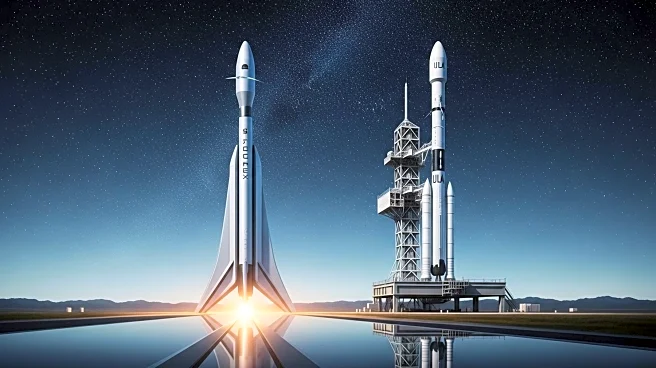What's Happening?
The U.S. Space Force has awarded significant contracts to SpaceX and United Launch Alliance (ULA) as part of its National Security Space Launch (NSSL) program. SpaceX secured five out of seven military missions, valued at $714 million, while ULA will handle the remaining two missions, worth $428 million. These contracts are part of a broader initiative to procure launch services for military missions, with a total of 54 missions planned between 2027 and 2032. SpaceX's upcoming missions include launching the 12th Wideband Global Satcom communications satellite and a satellite for the National Reconnaissance Office (NRO), among others. ULA will launch a GPS satellite and another NRO payload. Blue Origin, another contender, was not eligible for this round as its New Glenn rocket awaits certification.
Why It's Important?
This development underscores SpaceX's growing role as a primary launch provider for the U.S. Space Force, highlighting the company's competitive edge in the space launch industry. The contracts reflect the military's reliance on commercial space companies to fulfill national security objectives. The involvement of multiple companies, including ULA and potentially Blue Origin in the future, indicates a diversified approach to securing reliable launch capabilities. This strategy is crucial for maintaining the U.S.'s strategic advantage in space, especially as other nations, like China, expand their own space capabilities. The contracts also represent significant economic opportunities for the involved companies, potentially driving further innovation and investment in the U.S. space sector.
What's Next?
As SpaceX and ULA prepare for these missions, the focus will be on ensuring successful launches and meeting the Space Force's requirements. Blue Origin's progress with the New Glenn rocket will be closely watched, as its certification could open up additional opportunities in future NSSL rounds. The Space Force's continued collaboration with commercial partners is likely to evolve, potentially leading to more competitive and innovative solutions in the space launch market. The outcome of these missions will also influence future contract awards and the strategic direction of U.S. military space operations.









